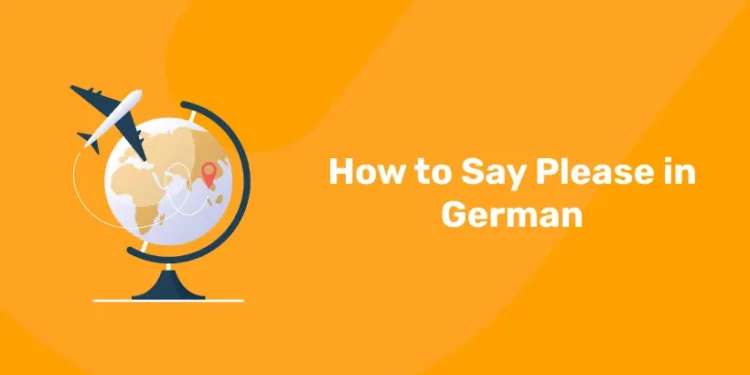Table of Contents
Learning German is not a difficult task. But learning from the right platform can do wonders. If you wish to learn the language with utmost clarity, you need time to tackle the language skills. You can speak like a native speaker once you improve your language skills.
Adequate vocabulary should be learnt initially. Learn to use advanced vocabulary to improve your language performance. German manners and language skills should be improved. You should know how to use German manners while using the language without hurting the listener.
It would help if you learned to be respectful and polite while speaking with someone in German. Here are the best ways to use the language respectfully while using it in a friendly environment and the best ways to learn how to communicate “please” in German. Each expression can improve your language skills and uplift your communication strategies. Know how to use the word “please” in German.
Elevate your German speaking skills with our German Language Course!
“Please” in German?
The word “bitte” is used to say please to the people with whom you’re communicating. It is one of the most significant words in the German language. The word please is used in every situation. “Bitte” is a word that can help you avoid rude and confusing situations. German speakers frequently use the word bitte while communicating. Please in German can have more than one meaning.
“Bitte” is used in various contexts. German speakers always resort to the polite way of dealing with the people. While asking for things, they always remain polite. You have to use “bitte” when you ask for something. You have to use bitte only appropriately. If you fail to use this word, it can be generally regarded as the rudest way of approaching. Here are the common ways by which you can use the word “bitte”!
Elevate your German speaking skills with our German Language Course!
“Bitte”- “Please” in German
1: How do you say "Good Morning" in German?
Here are some common examples on using “bitte” in German sentences along with the English equivalent.
- Check, please- Die Rechnung, bitte.
- One coffee, please.- Einen Kaffee, bitte.
- Can you please help me?- Kannst du mir bitte helfen?
- Where’s the railway station, please?– Wo ist der Bahnhof, bitte?
Free German A1 Mock Tests – Powered by AI!
Test your skills on our interactive platform. Get instant feedback from our AI to help you communicate better and track your progress. Start your free German mock test now.
Test Your German A1 for FreeHow to Say “please” in German?
Saying please in German is not a difficult task. German people value the country and their culture. Saying please and using politeness as a tool of communication is part of their culture. You should know how to use please in German. Using please in German is not that challenging.
Bitte can save you in such situations. Bitte is part of the day-to-day usage of the German language. You have to use it in your day-to-day life if you are using German daily. When you are living in a German-speaking country, it is inevitable to use please in German.
When you dwell in a German-speaking country, you will hear the word several times. The German native used please and thank you in most of the conversations. No matter if you are asking for permission, even a cup of coffee, or asking for directions, you need to use Bitte!
If you are not using bitte, you will sound rude and mean. You have to stick to the manners while you use the words in German. Knowing and understanding how to make use of please effectively speaks a lot.
Elevate your German speaking skills with our German Language Course!
Formal Alternatives to “Please” in German
Learn the formal alternatives to “please” in German:
-
Bitte schon
Your request will be strengthened if you add schon or sehr to the very end of bitte. Schon means beautiful and sehr in German means very. Both these German words will strengthen your request in German.
The word bitte schon is strong when compared to bitte. It is used to strengthen your request. It can also be used to emphasise your request. If the request is quite urgent and high in need using this formal alternative can help you achieve what you wish for.
The word bitten can be used as a verb. The German word please bitte is derived from the verb bitten. It is usually used to demand or ask for something. It is to demand strongly something. The words are extremely similar. You have to understand the meaning and difference of the words.
Elevate your German speaking skills with our German Language Course!
How to Respond to “Please” in German?
The common way to respond to please or bitte is to thank you in German. Thank you in German is “danke”. There are many variations to the word danke! Danke is the most common way to respond to bitte. You have to show the courtesy to respond to.
Thanking people in German after they have received help is quite common in German. There are numerous ways to express your gratitude. One of the best ways is to use the word thanks.
The thanks in German is Danke. You can use it in any situation you prefer to use. You can use it according to the situation checking the need for language. Formal or informal, you can use it based on the demands of the situation.
Elevate your German speaking skills with our German Language Course!
-
Danke schon
You can strengthen thank you by using “thank you very much”. You can simply use sehr or schon attached to it to strengthen the meaning of dance. It makes things more appealing to the listener. While using it in the formal sense, you can use Vielen Dank.
Where the capital D in the word Dank makes the word into a noun. The duties of both the words are the same. If you simply wish to thank people you can simply use the preposition fur.
Thus you can make learning more interactive and interesting. Learning German has its benefits. If you wish to learn the language, you need to know the basic grammar that is associated with it.
Free German A1 Mock Tests – Powered by AI!
Test your skills on our interactive platform. Get instant feedback from our AI to help you communicate better and track your progress. Start your free German mock test now.
Test Your German A1 for FreePracticing German Greetings: Tips and Exercises
The cornerstone of communication in every language is none other than greetings. Greetings make communication even smoother as they create a mood that is suitable for the situation. The tone of the interaction will be automatically reflected with the use of the apt greetings.
You will get a fostered sense of conversation once you use greetings before commencing the conversation. Respect, warmth, courtesy, and politeness can be reflected through out the German greetings. Mastering German greetings is essential for a person who wishes to migrate to Germany and reroot in a foreign land.
You have to learn the importance of the German language and the impression that it creates among the listeners.
- Formal
- Informal
- Regional greetings and farewells
German media can help you to give a vivid understanding of how you can aptly use German without losing its authenticity. The use of it by native speakers will only be understood once you plan to understand the essential nature of the language.
Elevate your German speaking skills with our German Language Course!
Listen to the native German speakers and nurture yourself in a German environment. German greetings can be understood from the German podcasts. They are the most effective ways to understand the meaning of the Greeyings. The welcoming procedure is simple to comprehend.
Watch German movies, series and short stories with and without subtitles to comprehend the nature of the language. Invest time to watch the German TV shows. Depend on a German friend or tutor to learn the newly learned German words and phrases which can help you in the long run.
You can learn German greetings and farewells with the help of experienced mentors. You will automatically learn the pronunciation and the diction within the given cultural context while you interact with the native Germans.
Before using the language, especially the greetings, you should know your audience. Choose the tone of the interaction wisely. Choose the appropriate tone of speech while you interact with people around you.
You have to distinguish between formal and informal occasions before randomly choosing any greetings. Sie is the formal word in German which can distinguish you from a stranger. The formal word sie can also be used to address people formally.
Elevate your German speaking skills with our German Language Course!
German Greeting Etiquette
Here are the basic German Greeting phrases along with its English equivalent to learn German effectively. These phrases should be learnt before adapting to the German Environment.
| German Phrase | English Equivalent |
| Guten Morgen. | Good morning |
| Guten Tag. | Good day |
| Guten Abend | Good evening |
| Servus | Goodbye |
| Gute Nacht | Good night |
| Schönes Wochenende! | Have a nice weekend! |
| Sehr erfreut! | Delighted! |
| Wie geht es Ihnen? | How are you? |
| Auf Wiedersehen | Goodbye |
| Schönen Tag! | Have a nice day! |
| Bis später | See you later |
| Hallo | Hello |
| Wie geht es euch? | How are you? |
| Wie geht’s? | How’s it going? |
| Wie geht es dir? | How are you? |
| Freut mich | Nice to meet you |
| Es geht | It’s okay |
| Mir geht es gut. Und dir? | I’m doing well. And you? |
| Bis morgen | See you tomorrow |
| Lange nicht mehr gesehen! | Long time, no see! |
| Alles klar? | All good? |
| Bis bald | See you soon |
| Tschüss! | Bye! |
Learning German from the best learning platform is the only way by which you can adapt easily to the German environment. You have to practice regularly to speak fluently in German. Learning German etiquette, manners and tone is very important while mingling with the native Germans.
Entri’s German Course will help you to evaluate your language skills comprehensively. The experts at Entri will be guided from the foundation to the advanced level. The course covers grammar, conversation skills, vocabulary, language skills, reading, writing, listening, and speaking skills.
Entri’s German Course includes interactive and user-friendly sessions that can help you to understand German phrases and diction with the help of the daily quizzes, practice tests, interactive lessons and so on. The experienced mentors at Entri’s German course will give you a systematic and comprehensive teaching-learning methodology that will ace your language-learning skills. Entri’s structured German course is “the one” solution for all your German language insecurities.
| Related Links | |
| How to Say Evening in German | How to Say Afternoon in German |
| How to Say Thank You in German | How to Say “Hi” in German |
| How to say “Can You Help Me” in German | How to say “Sorry” in German |
Free German A1 Mock Tests – Powered by AI!
Test your skills on our interactive platform. Get instant feedback from our AI to help you communicate better and track your progress. Start your free German mock test now.
Test Your German A1 for FreeFrequently Asked Questions
How to say please in German?
The word “bitte” is used to say please to the people with whom you’re communicating
How to say Nice to meet you in German?
Use Freut mich in German to substitute for the English greeting Nice to Meet You
How can you improve German language skills?
Watch German movies, series and short stories with and without subtitles to comprehend the nature of the language. Invest time to watch the German TV shows.
How can German media help in learning German language?
German media can help you to give a vivid understanding of how you can aptly use German without losing its authenticity.
What is thanks in German?
The thanks in German is Danke. You can use it in any situation you prefer to use. You can use it according to the situation checking the need for language












